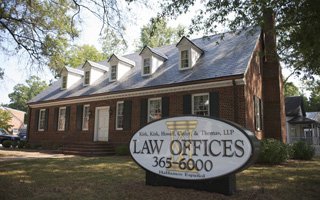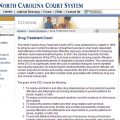Sex Offender Registry: What It Is & How To Petition For Removal
 Under North Carolina law, certain persons who have been convicted of certain sex offenses are required to establish and maintain registration in compliance with the North Carolina Sex Offender and Public Protection Registration Programs. The Registration Programs are governed by
Under North Carolina law, certain persons who have been convicted of certain sex offenses are required to establish and maintain registration in compliance with the North Carolina Sex Offender and Public Protection Registration Programs. The Registration Programs are governed by
The Registration Programs are governed by Chapter 14, Article 27A of the North Carolina General Statutes.
Who is Subject to the Registration Requirements?
Any person who has a “reportable conviction” and who resides in North Carolina, moves to North Carolina or is a resident student or nonresident worker in North Carolina must maintain registration. To see what convictions are determined to be “reportable convictions”, go to Sex Offender Registration.
A person who is required to register due to a “reportable conviction” must report in person to the appropriate sheriff’s office to comply with the “initial county registration” requirements of G.S. § 14-208.7.
When Must an Offender Register?
Resident offenders: shall register immediately upon conviction when an active term of imprisonment is not imposed. Otherwise, resident offenders shall register within three business days of release from a jail or prison, or upon arrival in a county to live, outside a jail or prison.
Non-Resident offenders: Anyone who has a “reportable conviction” and moves to North Carolina shall register within three business days of establishing residence in this State, or whenever the person has been present in the State for 15 days, whichever comes first. Registration should be with the sheriff in the county in which the offender resides.
Nonresident students: are required to register upon enrollment in any type of school in the State.
Nonresident workers: are required to register upon working for more than 14 days or for an aggregate period of more than 30 days in a calendar year. Registration should be with the sheriff of the county where the offender works or attends school.
How Long after Conviction Must an Offender Remain Registered
The length of time that an offender must remain on the registry depends on what type of offender they are. Some of the offenders are subject to the registration requirements under Part 2 of the Article 27A and others are subject to the registration requirements under Part 3 of Article 27A, as they’re considered serious criminal offenses. As you would expect, the requirements for offenders who register under Part 3 are more stringent.
Part 3 of Article 27A: applies to anyone who must register as a sex offender and is (a) convicted of an aggravated offense, (b) convicted of a repeat offense, and/or (c) determined by a court to be a sexually violent predator. To see what constitutes an aggravated offense, go to G.S. 14-208.6.
- Offenders registering under Part 3 of Article 27A must maintain registration for life and must verify their current residence every 90 days.
- These offenders are not eligible to file a petition for termination unless the conviction is reversed, vacated, set aside, or granted an unconditional pardon of innocence.
Part 2 of Article 27A,: offenders are are required to maintain a registration period of at least 30 years following the date of the initial county registration, unless the person successfully petitions the court to terminate the registration period. Such petitions may be filed in superior court 10 years after the initial county registration in North Carolina.
Part 2 Offenders and Requirements to be Eligible to Petition the Court for Termination of Registration
Ten years from the date of initial county registration in North Carolina, a person who is required to register under Part 2 (with the exception of those offenders who are also subject to Part 3) may petition the superior court to terminate his or her registration requirements.
If the reportable conviction is from North Carolina, the petition shall be filed in the district where the person was convicted. At least three weeks before the termination hearing, the district attorney in the district in which the petition is filed shall be given notice of the petition.
The hearing will provide the petitioner the opportunity to present evidence in support of the petition while the district attorney will be given the same opportunity to present evidence as to why the petition should be denied.
Termination of registration is completely in the discretion of the court. The court may grant relief if it finds all of the following:
- The petitioner has not been arrested for any crime that would require registration under Article 27A since completing the sentence.
- North Carolina is one the 34 states that are not in compliance with the Sex Offender Registration and Notification Act, or SORNA. Nevertheless, federal statutes appear to apply indirectly by virtue of G.S. 14-208.12A(a1)(2), which allows a judge to grant a petition to terminate registration only when the “requested relief complies with the federal Jacob Wetterling Act, as amended, and any other federal standards applicable to the termination of a registration requirement or required to be met as a condition for the receipt of federal funds by the State. With this being said, SORNA is very detailed and it would be best to contact an attorney to discuss the requirements and whether or not you have met those requirements.
- The petitioner is not a current or potential threat to public safety.
If the court grants the termination of registration, the clerk of court shall forward a certified copy of the order to the State Division of Criminal Information to have the person’s name removed from the registry. If the court denies the termination of registration, the person may file a petition one year from the date of the order denying the termination.
Talk with Legal Council about the Requirements of Your Sex Offender Conviction and Right to Petition Registration
If you have questions about a petition to terminate registration or other sex offense questions please contact an attorney in Wake County at Kirk, Kirk, Howell, Cutler & Thomas, LLP or call (919) 615-2473.
Protecting your Privacy ~ Your privacy is our primary concern. At Kirk, Kirk, Howell, Cutler & Thomas, LLP., we understand the importance of protecting your privacy and will never share your contact information with a 3rd party. Contacting our law firm does not imply any form of attorney-client relationship.
Information presented on this website should not be construed as formal legal advice or the formation of an attorney-client relationship. Additionally, any email sent to Kirk, Kirk, Howell, Cutler & Thomas, L.L.P. or any of its lawyers at the email addresses set forth in this website will not create an attorney-client relationship.













